De Braziliaanse dichter Carlos Drummond de Andrade werd geboren op 31 oktober 1902 in Itabira, een klein dorpje in de staat Minas Gerais. Zie ook alle tags voorCarlos Drummond de Andrade op dit blog en ook mijn blog van 31 oktober 2010.
Onder de douche beminnen
Onder de douche beminnen, zeep en kussen,
of in bad, beiden gekleed in water,
glibberende liefde, glippend, grijpend,
wijkend, water in de ogen, monden,
dansen, varen, duiken, regenen,
dat schuim op onze buiken, en de driehoek
van het schaamhaar wit – van water, sperma,
liefdes loop, of zijn wij bron geworden?
Vertaald door August Willemsen
In The Middle Of The Road
In the middle of the road there was a stone
there was a stone in the middle of the road
there was a stone
in the middle of the road there was a stone.
Never should I forget this event
in the life of my fatigued retinas.
Never should I forget that in the middle of the road
there was a stone
there was a stone in the middle of the road
in the middle of the road there was a stone.
The Word
I no longer want to consult
dictionaries in vain.
I only want the word
that will never be there
and that can’t be invented.
One that would resume
and replace the world.
More sun than the sun,
in which we all could
live in communion,
mute,
savouring it.
Vertaald door Mariza Góes
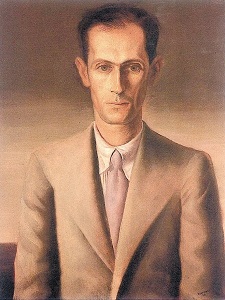
Carlos Drummond de Andrade (31 oktober 1902 – 17 augustus 1987)
Portret door Cândido Portinari, z.j.
De Oostenrijkse schrijver Jean Améry werd geboren op 31 oktober 1912 in Wenen. Zie ook mijn blog van 31 oktober 2010 en eveneens alle tags voor Jean Améry op dit blog.
Uit: Jenseits von Schuld und Sühne
„Als im Jahre 1964 in Frankfurt der große Auschwitz-Prozeß begann, schrieb ich den ersten Aufsatz im Zusammenhang mit meinen Erlebnissen im Dritten Reich, nach zwanzig Jahren Schweigens. Ich dachte zunächst nicht an eine Fortsetzung, wollte mir nur über ein Sonderproblem – die Situation des Intellektuellen im Konzentrationslager – klar werden. Als aber diese Arbeit verfaßt war, spürte ich, daß es unmöglich damit sein Bewenden haben dürfe. Auschwitz. Doch wie war ich dahin gelangt? Was war vorher geschehen, was sollte nachher kommen, wie stehe ich heute da?
Ich kann nicht sagen, daß ich in der Zeit der Stille die zwölf Jahre des deutschen und meines eigenen Schicksals vergessen oder »verdrängt« hätte. Ich hatte mich zwei Jahrzehnte lang auf der Suche nach der unverlierbaren Zeit befunden, nur, daß es mir schwer gewesen war, davon zu sprechen. Nun aber, da durch die Niederschrift des Essays über Auschwitz ein dumpfer Bann gebrochen schien, wollte plötzlich alles gesagt sein: so kam dieses Buch zustande. Dabei entdeckte ich, daß ich zwar manches bedacht, aber es viel zu wenig klar artikuliert hatte. Erst im Vollzug der Niederschrift entschleierte sich, was ich vorher in einer halbbewußten, an der Schwelle des sprachlichen Ausdrucks zögernden Denkträumerei undeutlich erschaut hatte.
Bald zwang sich auch die Methode auf. Hatte ich noch in den ersten Zeilen des Auschwitz-Aufsatzes geglaubt, ich könne behutsam und distanziert bleiben und dem Leser in distinguierter Objektivität gegenübertreten, mußte ich nun erfahren, daß es einfach unmöglich war. Wo das »Ich« durchaus hätte vermieden werden sollen, erwies es sich als der einzig brauchbare Ansatzpunkt. Eine nachdenklich-essayistische Arbeit hatte ich geplant. Eine durch Meditationen gebrochene, persönliche Konfession entstand. Auch sah ich sehr schnell ein, wie sinnlos es wäre, den vielen, teilweise ausgezeichneten dokumentarischen Werken, die zu meinem Themenkreis schon vorliegen, noch ein weiteres beizufügen. Bekennend und meditierend gelangte ich zu einer Untersuchung oder, wenn man will, zu einer Wesensbeschreibung der Opfer-Existenz.“
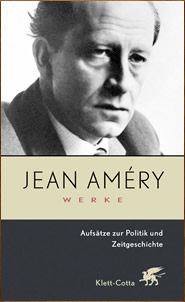
Jean Améry (31 oktober 1912– 17 oktober 1978)
Cover
De Engelse schrijver Nick Stone werd geboren op 31 oktober 1966 in Cambridge. Zie ook mijn blog van 31 oktober 2009 en ook mijn blog van 31 oktober 2010 en eveneens alle tags voor Nick Stone op dit blog.
Uit: Voodoo Eyes
“Every morning, without fail, Eldon Bums took a cab from his home in Coconut Grove to the boxing gym he owned on 7th Avenue in Liberty City — Miami’s roughest and most rundown neighbourhood, and no place for a sane man his age. Although the gym hadn’t functioned as such in over eight years, Eldon had refused to sell or rent out the building, because it was there, within its four walls, that he still felt a little like his old self, communing with his memories, smiling at the ghosts of past triumphs, remembering the time when, as Deputy Chief of Police, he’d as good as run the city. Inside, the gym was an ongoing ruin. Every day it fell apart a little more. The concrete floor, once painted with intricate diagrams of numbered feet, lay buried under a coating of dust so thick it looked like rancid manna. And it just kept on coming. The air was cut with a steady snow of fine filth, sullying the thick slants of sunlight that poured through the windows. The heavy bags hung rigid from rust-stiffened chains and brackets. The gym’s huge ring — once the biggest of its kind in Florida — stood in the centre, an ungainly heap of rotted oak and mildewed fabric. It had collapsed after an unattended leak in the roof opened up into a waterfall during a storm. Rain had soaked through the canvas and got into the wood. With time, heat and neglect, the structure had subsided as would an overwhelmed fighter, one leg at a time. It was now home to a colony of large brown rats, whose squeals and scuttlings had replaced the sounds of the gym; as had the distinct drone of the thousands of airborne insects that had found their way in through the ever-widening hole in the roof. Sometimes parrots, gulls and even pelicans got in too, but rarely found their way out; what the rats left of them added to the smell of militant decay about the place. The rats weren’t scared of Eldon. They were used to his daily visits, this eighty-four-year-old man literally retracing his steps across the dirt, walking slowly, his head bowed because he could no longer hold it as high as he used to. They’d peer out at him from under the canvas, eyes glinting in the darkness, as if wondering whether today was the day he too would become like those stray birds. Eldon paid them no more mind than he did what was left of his gym. He went into his office, on the right, its door in the middle of a wall of mirrors. The mirrors were two-way, just like in police interrogation rooms. He sat down behind the desk and looked out at the gym. He didn’t see it the way it was, but the way it used to be, back in the day, back in his day: a dozen fighters of all ages, skipping, sparring, spoedbagging, shadowboxing in front of the mirror, as oblivious to his presence now as they had been then.”
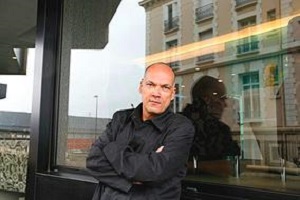
Nick Stone (Cambridge, 31 oktober 1966)
De Russische schrijfster Irina Denezhkina werd geboren op 31 oktober 1981 in Yekaterinburg. Zie ook alle tags voor Irina Denezhkina op dit blog en ook mijn blog van 31 oktober 2009 en ook mijn blog van 31 oktober 2010.
Uit: Give Me: Songs for Lovers
“Denya took me home without speaking, flashed his hand by way of goodbye and went back the same way. I leapt into the entrance, noting for the hundredth time out of the corner of my eye the words “WU-TANG Clan” on the wall. “Ilya phoned,” my mother informed me. “And how many more times do I have to tell you? It’s night outside, and you’re wandering around God knows where! Don’t let me have to tell you again!” She was gradually limbering up, warming herself up with her own indignation. “No more of these Ilyas.” I closed the door of the room and switched on the com-puter. While it was churning away I dialed the number. “Yes?” answered Lyapa. “Did you call?” “Yes.” “I’m home.” “That’s good. Call me sometime. We’ve got a gig at Milk soon. I’ll take you.” “Okay.” “Later?” “Later.” I put the phone down. Oh sugar, Lyapa! How long can you carry on being such a dead fish? Or not dead, just not interested in me. How come? Most guys come running if I just throw them one of those lingering looks. But I keep on looking and looking at Lyapa and it’s all just a waste of time. He sits there, smokes, looks the other way. At rehearsals they’re all falling over each other to amuse me and he just drums away to himself, ignoring me. Once he cut his finger on a torn cymbal. There was blood pouring down onto his dark green shorts; he was sucking furiously at the cut, getting blood on the wall. The drums were streaked with it. I sat there, wondering if I should give him my handkerchief. Volkova was nudging me with her elbow—go on, give it to him. But . . . it didn’t seem right somehow, I just couldn’t do it, I don’t know why. He didn’t look at me. I suppose he didn’t want any handkerchiefs from me. They began screeching gleefully in the earphones: “Keep on lighting up, never take a break, have,* and hang out all night long. Do drink andfinny powders, tell that school so long.” That’s about Lyapa. True, he doesn’t do drugs, but he drinks like a stallion and he’s always lighting up; never takes a break, hangs out all day and all night when they have con-certs. Some day he’ll be famous, and I’ll be there pointing—look, that’s my husband. He made a real effort at first to get my attention on the Net, sent me e-mails every day with “MISS YOU” in huge letters and heaps of exclamation marks.”
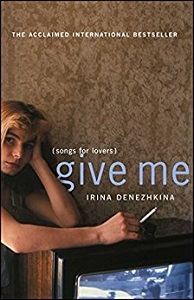
Irina Denezhkina (Yekaterinburg, 31 oktober 1981)
Cover
De Duitse schrijver Ernst Augustin werd geboren op 31 oktober 1927 in Hirschberg. Zie ook alle tags voor Ernst Augustin op dit blog en ook mijn blog van 31 oktober 2009 en ook mijn blog van 31 oktober 2010.
Uit: Robinsons blaues Haus
„In einer früheren, ferneren Version dieser Ge-schichte sagt Daniel Defoe, er habe eines der un-glaublichsten und abenteuerlichsten Leben gelebt. Ich sage: Ich auch.
Der Tod kommt in Gestalt eines freundlichen kleinen Herrn, der mir im Zug nach Grevesmüh-len gegenüber sitzt, und er kommt auch nicht sofort, vielmehr läßt er mir Zeit, meine Angele-genheiten zu regeln. Insbesondere dir, lieber Freund, ein beträchtliches Erbe zu hinterlassen. Ein in Ausmaßen und im Umfang geradezu ob-szönes Erbe, das ich dir vermache, vor allem eine Moral, mit der du, fürchte ich, am Ende ziemlich allein dastehen wirst. Lieber Freund. Als ich elf oder zwölf war, hatte mich mein Vater eines Tages beiseite genommen und ge-sagt: Du wirst es einmal schwer haben, mein Sohn, du wirst keine Freunde haben, du wirst entdecken, daß du allein bist, daß du dich auf einer Insel befindest — merke dir, mein Sohn — inmitten eines Ozeans von Menschen über Men-schen, die alle laut reden und alle etwas anderes meinen. Die ihre Seele daransetzen werden, dich von dieser Insel — so selig sie immer sein mag —zu vertreiben. Es sind sechs Milliarden, alle mit-einander, kannst du das verstehen? Ja. Vater. Nein, sagte er.
Ich erinnere mich an dieses Gespräch, das ich nicht verstand, das in dem mahagonifarbenen halbdunklen Arbeitszimmer meines Vaters statt-fand. Es ist immer halbdunkel dort gewesen, auf dem Schreibtisch brannte immer eine Bernstein-lampe, draußen fuhr die Straßenbahn. Es sind die Schatten, die mir im Gedächtnis geblieben sind, die tätowierten Köpfe der Maori an den Wänden, die Ledersessel von Mandel, der große Elefant aus dunklem Holz — sehr schwer, wenn ich mich gegen ihn lehnte.“
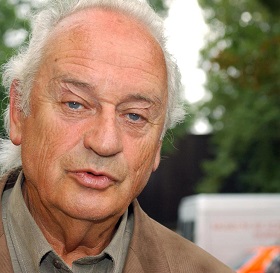
Ernst Augustin (Hirschberg, 31 oktober 1927)
